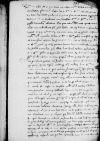List #1575
[Ioannes DANTISCUS] do [Mauritius FERBER]Cracow (Kraków), 1537-01-22
Rękopiśmienne podstawy źródłowe:
Publikacje:
| ||||||||||||||||
Tekst + aparat krytyczny + komentarz Zwykły tekst Tekst + komentarz Tekst + aparat krytyczny Ekscerpty dotyczące podróży Dantyszka
Reverendissime in Christo Pater et Domine, Domine mi observandissime. Salutem et mei commendationem plurimam.
Accepi hic a Dominatione Vestra Reverendissima cf.
Quando
Datum
[1 ] On December 1, 1536 Dantiscus was designated by the Warmia Chapter for the post of coadjutor to Warmia bishop Maurycy Ferber, but did not manage to obtain the official papal confirmation of his appointment before Ferber died (July 1, 1537)
[2 ] From the mid-15th century the Warmia Chapter presented every bishop elect with election capitulations (the articuli iurati) for him to sign. These obligated the bishop to defend the rights and privileges of the Church in Warmia and to recognize that the Chapter and the bishop were partners in managing the diocese. The capitulations also concerned more detailed issues of finances and jurisdiction. (cf. cf. Teresa Borawska, Tiedemann Giese (1480-1550) w życiu wewnętrznym Warmii i Prus Królewskich, Olsztyn, 1984 ⌊BORAWSKA 1984cf. Teresa Borawska, Tiedemann Giese (1480-1550) w życiu wewnętrznym Warmii i Prus Królewskich, Olsztyn, 1984 ⌋, p. 75, 76, 209), and also cf.
[3 ] The Royal Prussian gentry’s legation to the 1536/37 Diet included: Chełmno district judge
[4 ] Johann von Werden as a representative of the three great Prussian cities, together with Dantiscus and Jerzy Konopacki, he was in the Prussian Council’s legation to the 1536/37 Diet (cf. SBPN; cf. Janusz Małłek, Prusy Książęce a Prusy Królewskie w latach 1525 - 1548. Studium z dziejów polskiej polityki księcia Albrechta Hohenzollerna, Warszawa, 1976, series: Rozprawy i Materiały Ośrodka Badań Naukowych im. Wojciecha. Kętrzyńskiego w Olsztynie 53 ⌊MAŁŁEK 1976cf. Janusz Małłek, Prusy Książęce a Prusy Królewskie w latach 1525 - 1548. Studium z dziejów polskiej polityki księcia Albrechta Hohenzollerna, Warszawa, 1976, series: Rozprawy i Materiały Ośrodka Badań Naukowych im. Wojciecha. Kętrzyńskiego w Olsztynie 53 ⌋, p. 131)
[5 ] The Prussian gentry’s legation presented the king with gravamina containing about 20 objections, mainly against the Prussian Council and against the domination of the great cities (especially Gdańsk) over the region. The gravamina concerned economic matters (taxes, commerce, customs duty, measures and weights, minting of coins), legal issues (court procedure, court fine amounts, interpretation of the law on indigenousness, codification of Chełmno law, attacks by noblemen from neighboring voivodeships, accusations against Johann von Werden), administrative matters (the procedure of convoking general and particular assemblies, marking of territorial borders in Prussia), and defense (vetting) (print: cf. Gottfried Lengnich, Geschichte der Preussischen Lande Königlich-Polnischen Antheils Seit dem Jahr 1526, Biss auf den Todt Königes Sigismundi I, vol. 1, Dantzig, Johann Daniel Stollen, 1722 ⌊LENGNICHcf. Gottfried Lengnich, Geschichte der Preussischen Lande Königlich-Polnischen Antheils Seit dem Jahr 1526, Biss auf den Todt Königes Sigismundi I, vol. 1, Dantzig, Johann Daniel Stollen, 1722 ⌋, doc. No. 73, p. 173-183)
[6 ] The Royal Prussian assembly in Elbląg on September 29, 1536
[7 ] The Prussian Council legation’s written opinion on the gentry’s gravamina, presented to the king, contained detailed responses to all the problems listed by the gentry’s envoys. The text of this opinion was published by Lengnich (cf. Gottfried Lengnich, Geschichte der Preussischen Lande Königlich-Polnischen Antheils Seit dem Jahr 1526, Biss auf den Todt Königes Sigismundi I, vol. 1, Dantzig, Johann Daniel Stollen, 1722 ⌊LENGNICHcf. Gottfried Lengnich, Geschichte der Preussischen Lande Königlich-Polnischen Antheils Seit dem Jahr 1526, Biss auf den Todt Königes Sigismundi I, vol. 1, Dantzig, Johann Daniel Stollen, 1722 ⌋, doc. No. 74, p. 183-190.)
[8 ] Old German: Das ist nicht ihr Ding, es wird nichts daraus (free translation: This is not their business, so nothing will come of it )
[9 ] The swearing-in of Sigismund
II Augustus took place on February 4, 1537 (cf. cf.

